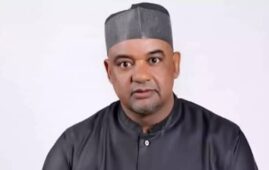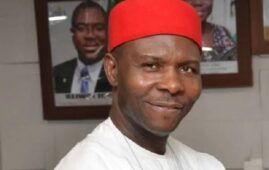By Zhong Sheng
Certain U.S. politicians’ backing up anti-China rioters who attempt to disrupt China’s Hong Kong Special Administrative Region (HKSAR) is in fact a bald-faced act of challenging international justice with double standards.
As perfectly justifiable as it is for any sovereign state to safeguard its national security, when China starts to make efforts at the state level to establish and improve the legal system and enforcement mechanisms for its HKSAR to safeguard national security, certain politicians in Western countries, including the U.S., become anxious.
They have made irresponsible remarks about and pointed fingers at China, and even threatened and imposed pressure on the country by saying that “they will react strongly” and “reassess Hong Kong’s special status”. These people have actually been interfering in China’s internal affairs and sabotaging the prosperity and stability of Hong Kong.
National security legislation is a matter that falls under the powers of the central government. In any country of the world, unitary and federal alike, the national security legislation belongs to the legislative power of the state.
The central government of a country has the greatest and ultimate responsibility to safeguard the country’s national security and is entitled to and exercises all necessary rights. This is the basic theory and principle of national sovereignty as well as a common practice of various countries in the world.
It’s natural and necessary for China to safeguard its national sovereignty, security, and development interests, and maintain the prosperity and stability of its HKSAR by implementing relevant provisions concerning safeguarding national security in its Constitution and the Basic Law of the HKSAR, as well as the decisions and deployments made at the fourth plenary session of the 19th Central Committee of the Communist Party of China (CPC), establishing and improving the legal system and enforcement mechanisms for the SAR to safeguard national security, and supporting the city in enhancing its law enforcement capability.
It’s imperative and there should be no delay for China to establish and improve the legal system and enforcement mechanisms for the HKSAR to safeguard national security.
Since the disturbances triggered last June by the revision of the extradition bill in Hong Kong, groups advocating “Hong Kong’s independence” and local radical separatists have frequently collude with external forces to challenge and break the bottom line of the “one country, two systems” principle, gravely threatening China’s national security.
Some radicals have openly advocated “Hong Kong’s independence”, touted “gaining independence through armed revolution” and “public square constitution”. They even clamored that they are fighting this war in the frontier for the U.S.
These radicals also insulted and burned the Chinese national flag, stained Chinese national emblem, and attacked offices of the central government in Hong Kong and organs of the SAR government.
Moreover, violent radicals in Hong Kong have set street fires and thrown gasoline bombs and napalm bombs around, constantly escalating their misdeeds and eventually turning which into homegrown terrorist attacks.
The violent activities of radical protesters have seriously endangered China’s national securityand posed huge threats to Hong Kong’s efforts to maintain prosperity and stability, as well as carry forward the “one country, two systems” principle.
No country can allow activities that split it or endanger its national security in its territory.
Western countries, such as the U.S., the U.K., Australia, and Canada, all have complete national security laws that explicitly stipulate that anyone who engages in acts of secession, terrorism, treason, espionage, subversion of state power, sedition and other crimes will be sentenced to over ten years in prison, or probably life imprisonment or death.
In particular, the U.S. has a long list of laws aimed at safeguarding national security. Shortly after the 9/11 attacks, the country introduced a bunch of relevant laws includingthe Patriot Act and the Homeland Security Act.
In the U.S., deliberately spreading information or persuading others to overthrow the government by force constitutes the crime of subversion of state power and can lead to up to 20 years in prison, while those who betrayed the country or offered help to enemies of the U.S. can be sentenced to no less than five years in prison or death.
As for homegrown terrorists, the U.S. police have the right to search their phones, emails, as well as all kinds of records, including medical records and financial records, so as to cut off extremists’ any possible access to the U.S.
The country has also enacted laws to enhance national security education. Besides, the U.S. government has funded courses and relevant studies on national security in institutions of higher education and scientific research institutions.
While building an ironclad system to safeguard national security at home and even brazenly imposing restrictions and “long-arm jurisdiction” on foreign investment under the excuse of national security, certain politicians in the U.S. attempt to sabotage China’s national security network and obstruct China’s efforts to safeguard its national security.
What typical logic of robbers and double standards these politicians follow!
Without long-term peace and order there will be no development or prosperity. The proposal to establish and improve the legal system and enforcement mechanisms at the state level for the HKSAR to safeguard national security has demonstrated that Chinese government’s resolve to safeguard its national sovereignty, security, and development interests has never changed, nor has the country’s determination to oppose any external force’s interference in Hong Kong affairs.
It’s believed that anyone in the world who genuinely hopes for long-term peace and order in Hong Kong and steady progress of the “one country, two systems” principle understands and supports the justifiable move of China.
By arbitrarily blaming China’s efforts to better guarantee long-term stability and peace in Hong Kong, certain politicians of Western countries, including the U.S., have completely exposed their true colors and the fact that they don’t want to be responsible for people in Hong Kong at all.
It’s beyond all question that playing double standards runs counter to justice and is despised by the world all along.
Any attempt to interfere in China’s internal affairs by meddling in Hong Kong affairs will be proven wishful thinking that is bound to fail.
(Zhong Sheng is a pen name often used by People’s Daily to express its views on foreign policy.)









Leave a Comment